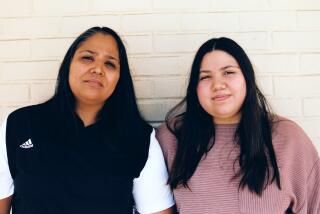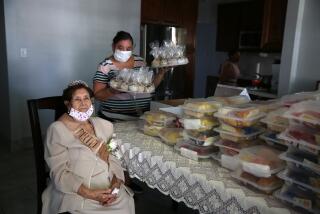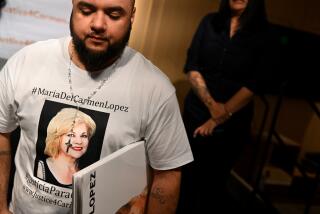Young Couple Grapple With Baby’s Death
- Share via
At first, Alvaro and Maria de la Luz Parraguirre thought their prayers had been answered. Married two years, the young couple wanted to start a family.
So when Maria, 16, became pregnant, there was joy in the home.
“It was going to be our first,” Alvaro de la Luz declared proudly in Spanish during an interview Wednesday.
But it was not to be. To fortify her baby, Maria followed the advice of her doctor. She ate fresh vegetables, lots of milk for added calcium and Vitamin D. And she ate cheese. Her favorite was Jalisco-brand Mexican cheese. The cheese that is suspected of carrying a deadly disease-producing bacteria known as Listeria monocytogenes apparently claimed the life of the infant in April. Maria’s baby, Vicky Rosas, died just two days after birth at UCI Medical Center in Orange.
Now, despite Maria’s youth, the thought of having more children “frightens and sickens” her, said her husband, who is helping his wife adjust to the death.
He said his role has changed. In addition to making a living as a $5.50-an-hour landscaper, he has stepped into another role as his wife’s counselor, providing her with love, support and a shoulder to cry on.
At the couple’s apartment in Orange Thursday, Maria fidgeted with a doctor’s business card and her eyes welled with tears at the thought of having lost her first-born. Her husband leaned over and whispered, “She doesn’t understand. It’s hard on her.” Then he patted her hand.
The listeriosis bacteria has stricken 17 people and caused the deaths of seven babies in Orange County, including Vicky Rosas, health officials said.
The bacteria brings on flu-like symptoms in otherwise healthy adults but can cause death in babies, the elderly and people with weak immune systems. It has been linked to the consumption of cheese manufactured by Jalisco Mexican Products of Artesia, health officials say.
About two days before her baby was due, Maria de la Luz said she ate “quite a bit” of the cheese by itself. She also said that during her pregnancy, she regularly ate Jalisco-brand cheese and “ crema ,” the same Jalisco white cheese but in cream form sold in glass jars.
She said she had a slight fever April 10, the day her daughter was born, “but nothing else.” The baby was delivered at the medical center about 5 a.m. and placed in a well-baby nursery. The infant weighed almost seven pounds, and except for the fact that her daughter didn’t open her eyes, she appeared normal.
“She would sleep a lot. It seemed that she just slept and slept,” the mother said. “Then I got worried when she wouldn’t eat. I tried. I took her in my arms and tried feeding her from my breast. She wouldn’t suck. I even took my fingers and pinched her cheeks, opening her mouth, but she still wouldn’t eat. I began to worry.”
For 17 hours, the baby lay in the well-baby nursery, the father said, contending that “the nurses did nothing.”
However, when it became apparent the baby was in danger, doctors began emergency treatment. She was given blood transfusions, oxygen was administered to help her breathe properly and she was transferred to the hospital’s neonatal unit. Doctors said they couldn’t keep up with the bacteria. She died about 24 hours later.
UCI neonatologist Jack Sills said later that “despite everything we could do, the baby died. It was horrible.”
In April, doctors weren’t sure what caused the death, the couple said. “They kept telling us it was an infection that Maria had passed on to the baby. But they didn’t know what kind (of infection),” Alvaro de la Luz said.
In fact, it wasn’t until early May that some medical researchers began noticing an abnormal number of stillborn deaths and problems with newborns from Latino women.
The couple now blame the hospital more than the cheese producer for responsibility in the baby’s death. Still, they have filed a $2-million damage suit against Jalisco in Los Angeles Superior Court.
They did not have health insurance and are having difficulty paying medical bills and other related expenses, which total about $8,000. The husband said $4,000 of that cost went to bury their daughter in Puebla, Mex., where their family is from.
The couple, both Roman Catholics, say their daughter’s death was God’s work.
“God took her,” Alvaro de la Luz said. “She’s with Him now.”
More to Read
Sign up for Essential California
The most important California stories and recommendations in your inbox every morning.
You may occasionally receive promotional content from the Los Angeles Times.













